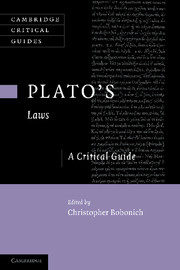Book contents
- Frontmatter
- Contents
- List of contributors
- Introduction
- 1 The Laws' two projects
- 2 The relationship of the Laws to other dialogues: A proposal
- 3 Ordinary virtue from the Phaedo to the Laws
- 4 Virtue and law in Plato
- 5 Morality as law and morality in the Laws
- 6 Puppets on strings: Moral psychology in Laws Books 1 and 2
- 7 Psychology and the inculcation of virtue in Plato's Laws
- 8 Images of irrationality
- 9 Family and the question of women in the Laws
- 10 The theology of the Laws
- 11 Plato's ‘truest tragedy’: Laws Book 7, 817a–d
- Bibliography
- Index
11 - Plato's ‘truest tragedy’: Laws Book 7, 817a–d
Published online by Cambridge University Press: 06 December 2010
- Frontmatter
- Contents
- List of contributors
- Introduction
- 1 The Laws' two projects
- 2 The relationship of the Laws to other dialogues: A proposal
- 3 Ordinary virtue from the Phaedo to the Laws
- 4 Virtue and law in Plato
- 5 Morality as law and morality in the Laws
- 6 Puppets on strings: Moral psychology in Laws Books 1 and 2
- 7 Psychology and the inculcation of virtue in Plato's Laws
- 8 Images of irrationality
- 9 Family and the question of women in the Laws
- 10 The theology of the Laws
- 11 Plato's ‘truest tragedy’: Laws Book 7, 817a–d
- Bibliography
- Index
Summary
In Laws 7.817a–d we find the following passage:
As for what people say are the serious poets, the ones we see occupying themselves with tragedy, let's suppose that some of them came to us and asked us the following sort of question: ‘Do we have your permission, as hosts, to enter your city and country, or not, and may we bring our poetry with us? Or what policy have you decided on in these matters?’ What would be the correct response to this to give to these gods among men? I think our answer is: ‘Most respected of guests, it's we who are the tragic writers, of the finest and also the best tragedy that we have it in us to create: thus the whole political regime that we are proposing constitutes a representation (mimêsis) of the finest and best life, which is the very thing that we say tragedy really is, the truest sort. So you are poets, but we are poets too, working in the same genre, your rivals and competitors for the finest play, which – so the hope is, on our side – it is the nature of true law alone to complete (apotelein). So don't imagine that we'll be too ready, ever, to give you permission to set up your stage in the agora, bringing on actors with fine voices carrying further than ours, and to give you licence to harangue children and women and the populace at large – talking about the same practices but not saying the same things about them as we do, indeed as a general rule saying exactly the opposite, in most cases. […]
- Type
- Chapter
- Information
- Plato's 'Laws'A Critical Guide, pp. 217 - 231Publisher: Cambridge University PressPrint publication year: 2010



